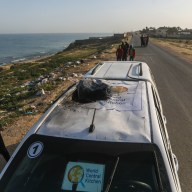WASHINGTON – Counterterrorism officials have issued security bulletins to police around the U.S. about terrorists’ desire to attack stadiums, entertainment complexes and hotels – the latest in a flurry of such internal warnings as investigators chase a possible bomb plot in Denver and New York.
In the two bulletins – sent to police departments Monday and obtained by The Associated Press – officials said they know of no specific plots against such sites, but urged law enforcement and private companies to be vigilant. These two bulletins followed on the heels of a similar warning about the vulnerabilities of mass transit systems.
The bulletin on stadiums notes that an al-Qaida training manual specifically lists “blasting and destroying the places of amusement, immorality, and sin… and attacking vital economic centres” as desired targets of the global terror network.
A joint statement from Department of Homeland Security and the Federal Bureau of Investigation said while the agencies “have no information regarding the timing, location or target of any planned attack, we believe it is prudent to raise the security awareness of our local law enforcement partners regarding the targets and tactics of previous terrorist activity.”
Officials noted the law enforcement bulletins are not intended for the public. Bulletins – particularly about hotels as possible targets – are common, and often don’t make news. However, a half-dozen alerts issued in the last week have received increased attention amid the current investigations in New York and Denver. The first of these, about hydrogen peroxide-based explosives, specifically referred to the investigation in New York.
Separately, law enforcement officials said a Colorado man may have been planning with others to detonate backpack bombs on New York City trains in a terrorism plot similar to past attacks on London’s and Madrid’s mass-transit systems.
The investigation and the earlier warning about mass transit system have already prompted officials around the nation to step up patrols.
Two law enforcement officials speaking on condition of anonymity because they were not authorized to discuss details of the investigation told The Associated Press late Monday that more than a half-dozen individuals were being scrutinized in the alleged plot.
In a statement, the FBI says that “several individuals in the United States, Pakistan and elsewhere” are being investigated.
Investigators say Najibullah Zazi, a 24-year-old Afghanistan-born immigrant who is a shuttle van driver at the Denver airport, played a direct role in the terror plot that unraveled after an overnight 1,600-mile (2,575 kilometre) trip from Denver to New York City around the anniversary of the Sept. 11, 2001 attacks. He made his first court appearance Monday and remains behind bars.
Zazi and two other defendants have not been charged with any terrorism counts, only the relatively minor offence of lying to the government. But the case could grow to include more serious charges as the investigation proceeds.
Backpacks and cellphones were seized last week from apartments in Queens, where Zazi visited.
Zazi has publicly denied being involved in a terror plot, and defence lawyer Arthur Folsom dismissed as “rumour” any notion that his client played a crucial role.
Publicly, law enforcement officials have repeatedly said they are unaware of a specific time or target for any attacks. Privately, officials speaking on condition of anonymity because they were not authorized to discuss the case said investigators have worried most about the possible use of backpack bombs on New York City trains, similar to attacks carried out in London in 2005 and Madrid in 2004.
Backpack bombs ripped apart four commuter trains and killed 191 people in Madrid on March 11, 2004. On July 7 the next year, bombing attacks in London killed 52 subway and bus commuters.
In a bulletin issued Friday, the FBI and Homeland Security Department warned that improvised explosive devices are the most common tactic to blow up railroads and other mass transit systems overseas. And they noted incidents in which bombs were made with peroxide.
In that bulletin, obtained by The AP, officials recommended that transit systems conduct random sweeps at terminals and stations and that law enforcement make random patrols and board some trains and buses.
Investigators feared Zazi may have been involved in a potential plot involving hydrogen peroxide-based explosives, according to two law enforcement officials, who spoke on condition of anonymity because they were not authorized to discuss the investigation.
The FBI said they found notes on bomb-making instructions that appear to match Zazi’s handwriting, and discovered his fingerprints on materials – batteries and a scale – that could be used to make explosives. He also made a trip to Pakistan last year in which he received al-Qaida explosives and weapons training, the government said.
Zazi, a legal resident of the U.S. who immigrated in 1999, told the FBI that he must have unintentionally downloaded the notes on bomb-making as part of a religious book and that he deleted the book “after realizing that its contents discussed jihad.”
–
Associated Press Writers Ivan Moreno, P. Solomon Banda, and Catherine Tsai in Denver, and Tom Hays in New York contributed to this report.
















